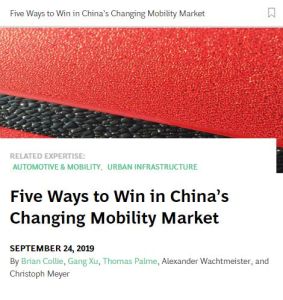
Read or listen offline
Amazon KindleRecommendation
As China embraces new mobility modes, domestic providers are enjoying Beijing’s deep-pocket funding and preferential policies. Foreign manufacturers risk losing their positions in this massive, lucrative and swiftly evolving market. A team of Boston Consulting Group managing directors and partners knowledgeable of the automotive and mobility sector bring a wealth of expertise to their concise outline of the competitive landscape in China’s new mobility markets. Along with a sobering assessment of the challenges facing foreign original equipment manufacturers, their paper offers essential insights to help incumbents stay in the game.
Summary
About the Authors
Brian Collie, Gang Xu and Alex Wachtmeister managing directors and partners at Boston Consulting Group (BCG), leading the firm’s automotive and mobility sector. Thomas Palme, also a managing director and partner, serves as a core member of the automotive and mobility sector and a member of the Center for Mobility Innovation. Christoph Meyer consults with BCG, focusing on international mobility and transportation.


















Comment on this summary